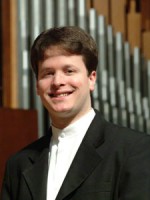Title
Since 2003, Juilliard has presented the annual Jerome L. Greene Concert to honor the memory of the late Mr. Greene, a patron who for many years served as a trustee of the School. Since its inception four years ago, the concert has prominently featured music of the Baroque and early Classical epochs, reflecting Mr. Greene’s love of this repertoire. This year’s concert features Paul Jacobs, chair of the Juilliard organ department, as well as a trio of Juilliard students in performances of Bach’s keyboard and organ music—some of it arranged for string trio by none other than Wolfgang Amadeus Mozart.
Body
The concert itself will alternate between Mozart’s string adaptations of Bach and music originally composed by Bach for the organ. After each Mozart arrangement, Mr. Jacobs will perform one of four great organ Preludes and Fugues, each of which will be familiar to organists but may be lesser known to the average concertgoer. Indeed, Mr. Jacobs feels very strongly that the Greene Concert offers an opportunity for classical music enthusiasts to become acquainted with this often overlooked repertoire. After all, it was chiefly as an organ virtuoso that Johann Sebastian Bach was esteemed during his own lifetime, and his organ works have inspired generations of composers who came after him: Liszt was known to have had a particular affinity for the shockingly bold Fantasia in G minor, BWV 542, and Brahms frequently included his own transcriptions of Bach organ Preludes and Fugues on his piano recitals.
Perhaps, then, it is something of a mystery that so many of Bach’s organ works languish in relative obscurity, even as Bach’s music in general has never been more popular. But whatever the reason for its neglect, this substantial body of work has an ally in Mr. Jacobs, who has performed the complete organ works of Bach on several occasions, including in an 18-hour, nonstop marathon concert while an undergraduate. Says Jacobs, “Organ construction, composition, and performance served as a center of gravity throughout Bach’s life. Not only should his marvelous organ Preludes and Fugues command our awareness and reverence, but, ultimately, our love.”
The inclusion of Mozart’s arrangements on the concert program provides a rare opportunity for audience members to experience a seldom explored side of that composer. Mozart, who was by all accounts a tremendous virtuoso organist, assembled his Six Preludes and Fugues for Violin, Viola and Cello, K. 404a, from a variety of Bach keyboard pieces (including The Well-Tempered Clavier and the C-minor Trio Sonata for organ); four will be performed at the Greene Concert. In this age of “historically informed performance practice,” which tends to eschew that which is (or is perceived to be) inauthentic to a particular style, Mozart’s amalgam is an attractive reminder that composers of the Baroque and Classical periods often took great liberty in adapting their own music, as well as music of other composers, to suit particular situations. In his arrangements, Mozart occasionally alters Bach’s original tonality to facilitate ease of playing on stringed instruments, and in three of the six pieces dispenses with Bach’s Prelude altogether, substituting instead one of his own composition.
The venue for this year’s Jerome L. Greene Concert is St. Peter’s Lutheran Church, located at Lexington Avenue and 53rd Street. St. Peter’s is, in many respects, an ideal location for a concert of Baroque music. Unlike at many churches where organ and organist are tucked far from view, the Klais organ of St. Peter’s Church is prominently situated within the sanctuary, making it possible to observe the performances as one might in a concert hall. The organ itself is an instrument patterned after those Bach would have played; the organ works, when performed on such an instrument by such an artist as Mr. Jacobs, promise to excite.
The Greene Concert comes on the heels of Mr. Jacobs’ performance of Olivier Messiaen’s Livre du Saint-Sacrament at the Church of St. Mary the Virgin last month, a concert offered in conjunction with Jacobs’s role as the L&M Department’s William Schuman Scholars Chair. The two programs, which might be said to be aesthetically antipodal, convey Mr. Jacobs’s passionate devotion to music which, on the surface, has little in common. “Bach and Messiaen, two composers closest to my heart—to play their transcendent music, or even to the listen to it with a vulnerable spirit, compels me to forget about myself and all temporal concerns.”





